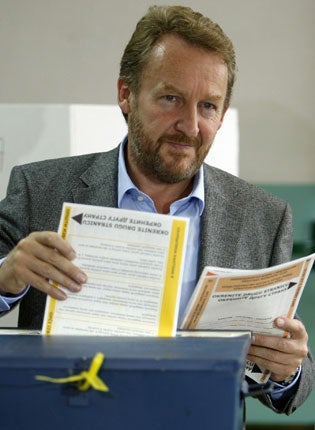Bosnians vote in general elections but reconciliation slow in a nation still divided

More than three million voters went to the polls yesterday in general elections in Bosnia, which are likely to keep up the deep ethnic divisions and bring no solution to the political stalemate in the country that has barely recuperated from the bloody war of the 1990s.
The elections were preceded by a brutal nationalist campaign conducted by leaders who presented themselves primarily as custodians of their Bosniak Muslim, Croat or Serb ethnicities, in spite of woeful economic conditions in a country where unemployment stands at 43 per cent. Some $15bn (£9.5bn) pumped in to the country since the end of the 1992-95 war have vanished into thin air or into the pockets of corrupt politicians.
"I expect nothing particular from the elections," said Sarajevo housewife Fatima Basic, 55, as she cast her vote. "People still vote for hot words and not for those who could change their lives for better."
There is little hope that voting will introduce new leaders that could launch badly needed political and economic reforms, including the strengthening of the institutions of central government in Sarajevo, a key condition for EU entry.
At present the country's complicated power structure means that elections will select five separate presidents and 700 MPs. But reform is ruled out at present by the conditions laid out in the Dayton Peace Accords that ended the war, under which the country is divided into two semi-autonomous entities, the Republic of Srpska (RS) and Muslim-Croat Federation.
The RS is not willing to cede any autonomy to Sarajevo and it has focused on demands for secession after Kosovo proclaimed independence from Serbia in 2008. Croat leaders call for the creation of their autonomous region within Bosnia, while Bosniak Muslims say the only future lies in a united country.
In the meantime, only the capital of Sarajevo and Banja Luka, the capital of the RS, look like bustling, modern cities, thanks to post-war renovations and relatively strong local economies. Most people elsewhere rely on small pensions or remittances from families living abroad.
Reconciliation is slow in Bosnia, where 100,000 people, mostly Bosniak Muslims, died in the war. Bosnian Serbs hardly admit that the Srebrenica massacre of 8,000 Muslim men and boys in 1995 ever happened, and their leader, Milorad Dodik, calls Belgrade the capital of his nation, rather than of Sarajevo. Inter-ethnic marriages, a quarter of all unions before the war, are now scarce. With two million people displaced by the conflict and very few returning, it is also doubtful how many people live in Bosnia, as no census has been carried out since 1991.
The school curricula remain completely separate, with Serb children relying on Serbian, Croat children on Croat and Bosniak children on Sarajevan textbooks. They speak separate languages and history is shaped in accordance to national myths that differ profoundly.
Preliminary results last night put Social Democrat Zeljko Komsic ahead for the presidency's Croat seat. The Bosniak front-runner was Bakir Izetbegovic, of the predominantly Bosniak Party for Democratic Action.
In the lead for Serb post was the incumbent Nebojsa Radmanovic, of the Alliance of Independent Social Democrats.
Subscribe to Independent Premium to bookmark this article
Want to bookmark your favourite articles and stories to read or reference later? Start your Independent Premium subscription today.

Join our commenting forum
Join thought-provoking conversations, follow other Independent readers and see their replies